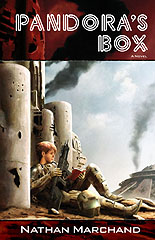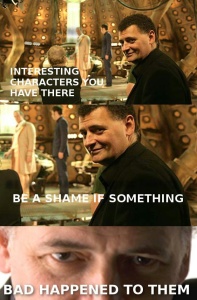 Marvel Comics recently announced it was launching a new title with an all-female Avengers team called A-Force. It seems like it will feature many of the House of Ideas’ most famous superheroines—like She-Hulk, Black Widow, and Phoenix—many of whom have been members of the main Avengers team.
Marvel Comics recently announced it was launching a new title with an all-female Avengers team called A-Force. It seems like it will feature many of the House of Ideas’ most famous superheroines—like She-Hulk, Black Widow, and Phoenix—many of whom have been members of the main Avengers team.
I’m not opposed to this idea in concept. If Marvel thinks they can generate good stories with a team like this, I’m all for it. The problem, I think, is that doesn’t seem to be their motivation. This reeks of political correctness. It’s an attempt at “diversifying” their titles because they think it’ll appeal to a wider audience. (Ironic considering this team technically isn’t diverse because it has no men on it).
The comic book industry has been dominated by men since its inception. Generally speaking, male authors write male protagonists because they’re drawing upon their own experiences as a male. Now, that doesn’t mean they haven’t written any female characters well. I’d argue there are plenty out there. Unfortunately, comics have a reputation for presenting those characters as sexual objects. Some of it is deserved, but I’d say some of it isn’t. It depends on the individual creators, companies, and/or eras. Regardless, my point remains that it’s understandable that superheroines are a minority in comics because most creators are male (and that’s not a bad thing).
This comic, whether it’s good or not, seems like it’s based on the notion that particular demographics won’t enjoy a story unless the protagonists share their gender, ethnicity, religion, and/or whatnot. In this case, they could be assuming that women won’t read the regular Avengers titles because there are only a few women on the team at any given time (in the first movie, there was only one). This extends to other demographics (i.e. only black people will enjoy stories featuring black characters).
I reject this idea. I’m sure it’s true for some people, but I don’t think most audiences care. What I look for is a good story with characters I like and/or identify with. This goes way beyond skin color or reproductive organs. A truly great story is one that focuses on human experiences, which transcend those outward superficial differences. I read/watch The Hunger Games because it has a good story; the protagonist’s gender had little or no effect on my enjoyment. Everyone has dealt with stuff like trauma, pain, joy, love, and rejection. Those things aren’t a respecter of persons, whether they be fictional or real.
 One of my favorite characters in the Star Trek franchise is Benjamin Sisko from Deep Space Nine. Obviously, he’s a black man. But guess what? I never notice. What do I notice? His soft-spoken demeanor, his furious temper, his love for his son, and the pain of losing his wife in battle. All universally human experiences. Read this excerpt from the show’s bible that describes the character. Nowhere does it mention his ethnicity. It was only brought up in the show when it was necessary. That’s how it should always be handled. A character’s ethnicity, gender, and/or religious beliefs can be used to create drama (or comedy), but it shouldn’t define them. It’s only a small part of who they are. Trying to base the character around those traits will, in fact, alienate audiences.
One of my favorite characters in the Star Trek franchise is Benjamin Sisko from Deep Space Nine. Obviously, he’s a black man. But guess what? I never notice. What do I notice? His soft-spoken demeanor, his furious temper, his love for his son, and the pain of losing his wife in battle. All universally human experiences. Read this excerpt from the show’s bible that describes the character. Nowhere does it mention his ethnicity. It was only brought up in the show when it was necessary. That’s how it should always be handled. A character’s ethnicity, gender, and/or religious beliefs can be used to create drama (or comedy), but it shouldn’t define them. It’s only a small part of who they are. Trying to base the character around those traits will, in fact, alienate audiences.
 Adding arbitrary diversity also hampers stories. Case in point: Tauriel in Peter Jackson’s Hobbit films. She’s not from the book or any of J.R.R. Tolkien’s Lord of the Rings canon. She was created by Jackson and his wife, Fran, because they wanted to add a woman to the almost all-male cast in the hopes of attracting a female audience. She’s completely extraneous to the story. What little purpose she has is to serve as one point in an unnecessary love triangle between her, Kili, and Legolas (who also wasn’t in the book, but I’m willing to accept him here because it’s arguable he was one of the Elves in the story). In other words, Jackson seems to think women want to see cliché “love stories” that go nowhere. Tauriel might be an okay character in concept, but ultimately she’s just part of what amounts a big-budget fanfiction. Instead, Jackson should’ve focused on Bilbo’s growth, which anyone can identify with. Stories don’t need to have romance to be appealing to women.
Adding arbitrary diversity also hampers stories. Case in point: Tauriel in Peter Jackson’s Hobbit films. She’s not from the book or any of J.R.R. Tolkien’s Lord of the Rings canon. She was created by Jackson and his wife, Fran, because they wanted to add a woman to the almost all-male cast in the hopes of attracting a female audience. She’s completely extraneous to the story. What little purpose she has is to serve as one point in an unnecessary love triangle between her, Kili, and Legolas (who also wasn’t in the book, but I’m willing to accept him here because it’s arguable he was one of the Elves in the story). In other words, Jackson seems to think women want to see cliché “love stories” that go nowhere. Tauriel might be an okay character in concept, but ultimately she’s just part of what amounts a big-budget fanfiction. Instead, Jackson should’ve focused on Bilbo’s growth, which anyone can identify with. Stories don’t need to have romance to be appealing to women.
 In the very early stages of writing my first novel, Pandora’s Box, I thought the protagonist would be male. But as the story progressed, I realized it’d be better if the “hero” was actually a heroine. By doing that, I believe I made the story much stronger and more interesting. I didn’t do it to broaden (or narrow) it’s appeal or make some sort of statement—I did it because it was what the story needed. That’s why one of my author mantras is, “Story is king.” Whatever my tale needs, I give it. If it’s a female protagonist, then a female protagonist. If it’s a German scientist, then a German scientist. If it’s a trope-tastic ninja, then a trope-tastic ninja. 😛
In the very early stages of writing my first novel, Pandora’s Box, I thought the protagonist would be male. But as the story progressed, I realized it’d be better if the “hero” was actually a heroine. By doing that, I believe I made the story much stronger and more interesting. I didn’t do it to broaden (or narrow) it’s appeal or make some sort of statement—I did it because it was what the story needed. That’s why one of my author mantras is, “Story is king.” Whatever my tale needs, I give it. If it’s a female protagonist, then a female protagonist. If it’s a German scientist, then a German scientist. If it’s a trope-tastic ninja, then a trope-tastic ninja. 😛
So, if you’re concerned with having diversity in your story, don’t bother unless it’ll serve it well. Focus instead on telling as good of a story as you can. That will get you an audience from all races, colors, and creeds.






